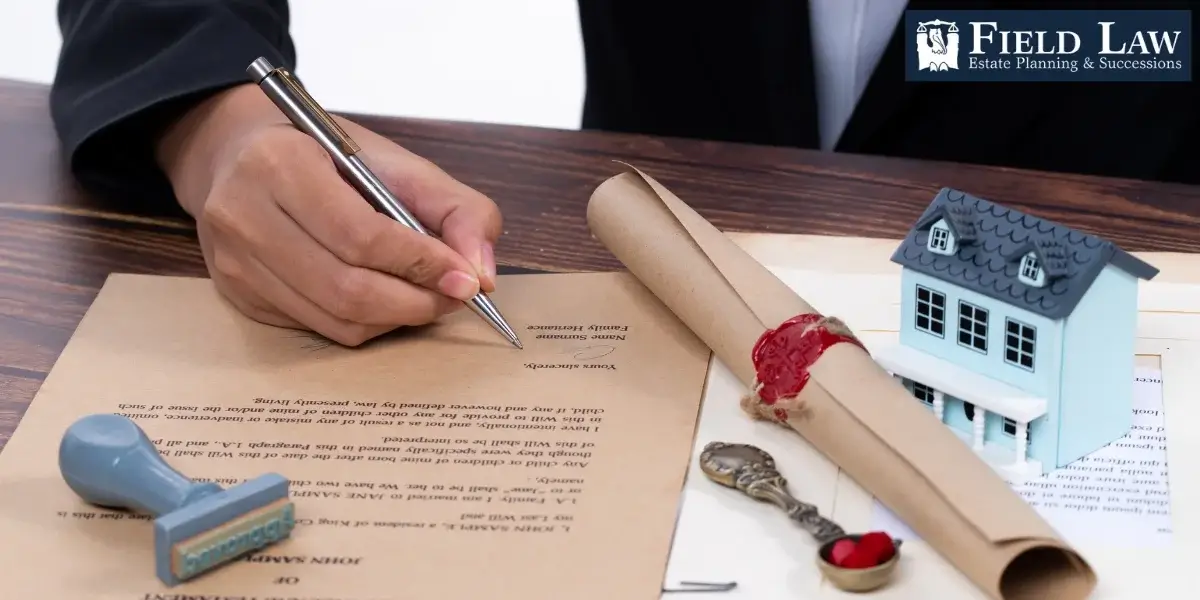Baton Rouge Estate Planning Lawyer
Baton Rouge Estate Planning Attorney
Creating a thorough estate plan can help your loved ones after you’re gone. This way, they’ll have documentation to help them answer difficult questions about your financial and medical circumstances after you are injured or pass away.
Even those with more modest means can benefit from an estate plan, as it outlines many decisions about their future. To learn more, contact a Baton Rouge estate planning lawyer.

A Louisiana Estate Plan That Fits Your Vision
Each of us wants control over our medical care, retirement arrangements and the fate of our hard-earned assets. Right now, you have full autonomy over these matters. But in the future, you may not, if you do not have such wishes in writing.
In the case of death or incapacity, decisions about your estate, your medical care and your legal affairs will be left to someone else – which is why you need an estate plan in place.
Help During Each Stage of the Process
At Field Law, in Baton Rouge, Louisiana, we provide guidance on all aspects of estate planning. We’re committed to creating a uniquely tailored plan for you and your family that addresses your needs and vision. Working with us means an open, collaborative process focused on answering your questions and addressing your concerns at each step of the way.
Estate Planning Is About More Than Just Property
A well-crafted estate plan will address not only your wishes regarding property, but also your decisions regarding:
- End-of-life care and medical treatment (through a living will)
- Disposition of your body (for example, burial or cremation)
- Guardian designations for your minor children
- Trusted individuals to make decisions on your behalf (through powers of attorney)
- Addressing blended families in a way that minimizes the risk of disputes
- Providing for your pets and any charitable causes you’re passionate about
- Establishing a succession plan for your business, if applicable
We can help you put the right documents in place to effectuate those decisions, like a will, trust or other legal document.
Updating Your Estate Plan
Keeping your estate plan updated is almost as important as creating one in the first place. Your circumstances may change drastically over time, so it is important to keep in contact with your family and your attorney to keep the documents current. Most elements of an estate plan can be easily updated with new information implemented with legal help.
When To Update Your Will, Trust Or Estate Plan
You should consider updating your Will, Trust or other estate planning documents when:
- Someone in your document passes away or is incapacitated.
- You have a new, spouse, child or family member you wish to include.
- Your chosen agent, executor, or trustee has lost your confidence.
- Something else changes, such as the size of your estate.
- You want to make a change.
How To Update
If Field Law did not prepare your current Will, Trust or other estate planning documents, you can easily schedule a free consultation. During your consult, your estate planning attorney can quickly scan your document and discuss your desired changes. We can then prepare a proposal to move forward with next steps.
If you originally got your Will, Trust and other estate planning documents at Field Law , the process is easy. Many small changes can be made without an office visit and we can schedule you to sign in a business day or two. For larger changes, you can schedule a free consult with your attorney to discuss those changes and next steps.
Giving a portion of our earnings to others is a major part of each of our lives. Whether tithing at church, supporting cancer research, wildlife conservation, or working to preserve our environment, we often give throughout our lives. Even buying season tickets at LSU requires a donation. Why would this stop when we die?
Nonprofit giving is part of the estate planning process. Nonprofits rely on a steady source of giving and your incapacitation or death can disrupt giving, especially for small local nonprofits that you support, like your church.
Many charities make asks for donations through your Will or Trust and you will need to communicate your wishes clearly since your executor or trustee cannot give away money unless directed to, no matter your giving history.
You should also consider giving instruction in your financial mandate (also called power of attorney in other states) to allow your agent to continue your giving during incapacitation.
When crafting your estate plan, ensure your wishes are carried out for charitable giving as well. Your estate planning attorney at Field Law can discuss ways for you to give during incapacitation and after your passing.
Get Started Today. Schedule A Free Consultation.
Let us help you build the right plan to gain peace of mind for the present and future. Start today. Schedule a free consultation by calling 225-341-5270 or reaching out online.
Serving clients in Louisiana and out-of-state relatives with estate planning and successions.
FAQs
Q: What Are the Pros and Cons of Putting Your Estate in a Trust?
A: The pros and cons of putting your estate in a trust can vary based on your circumstances. Different kinds of trusts make more sense for different kinds of estates. Revocable trusts allow the creator to change the trust as needed, but this flexibility could open you up to creditors if you owe money before your death. Irrevocable trusts offer protection from creditors, but they become permanent once established, meaning they cannot be changed if your financial circumstances change.
Q: What Type of Lawyer Is Right for Estate Plans?
A: An estate planning attorney is typically the most effective for estate plans. They usually have a general understanding of wills, trusts, estate plans, and successions. Your lawyer should have vast experience in the field of estate planning, allowing them to provide you with informed advice. They can help you create a will, trusts, and powers of attorney. They can also advise you on how to make the succession process easier for your loved ones or avoid succession completely.
Q: What Is the Ideal Age to Make an Estate Plan?
A: The ideal age to make an estate plan can vary. While some suggest creating an estate plan as soon as you become a legal adult, others suggest creating an estate plan after certain milestones.
Financial situations where it might make sense to create an estate plan include getting married, having children, or buying a house. Once your estate plan is created, it is a good idea to revisit it every few years to make sure it is still accurate. This can be accomplished through an estate planning attorney.
Q: Does a Trust Avoid Succession in Louisiana?
A: Items placed in a trust can avoid the Louisiana succession process. However, certain items that cannot go into a trust could be subject to succession. It is also still a good idea to create a will along with a trust to ensure your assets are covered, even if you forget to put them into your trust. For more information on ways to avoid succession in Louisiana, contact an estate planning lawyer.
Assisting Both In-State and Out-of-State Individuals
You don’t have to go through the estate planning process alone. Working with an attorney can help you develop a comprehensive plan to assist both your loved ones and yourself when the time comes. They can also help regularly update your plan if your estate changes or if you go through new life changes. Schedule a consultation with Field Law today to learn how we can help craft your estate plan.




